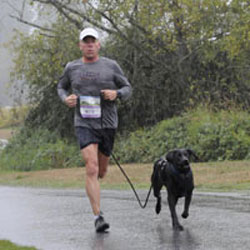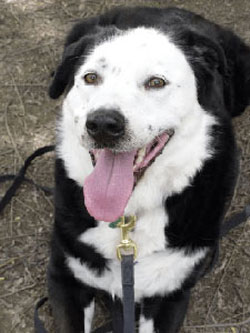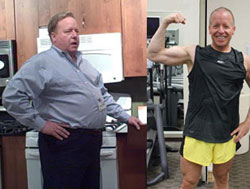
“Eat healthy, exercise, and lose weight with your pet. Helping animals helps people.
Overweight people and overweight pets go together, hand in leash,” says Eric, a 57-year-old salesman from Spokane, Washington, who speaks from experience. He says a plump dog named Peety helped turn him from a couch potato struggling with obesity into a slim athlete.

The makeover began in 2010. Tipping the scales at 330 pounds, Eric was inactive and withdrawn. Living alone, he often wolfed down two extra-large pizzas for dinner. His poor health was costing him more than $1,000 a month in medications for type 2 diabetes, high cholesterol, and high blood pressure. His doctor even suggested buying a cemetery plot, because at the rate Eric was going, he would probably need one in the next 5 years.couch potato struggling with obesity into a slim athlete.
“My doctor was being brutally and unequivocally honest by telling me that I would likely be deceased within 5 years unless I implemented immediate lifestyle changes to improve my health. This was the motivation I needed to make these changes.”
“Helping animals helps people,” says Eric, whose rescue dogs have given him a reason to love. Above, he runs with Jake, a Labrador retriever mix he adopted in Seattle after Peety passed away.

Peety, a border collie/Australian shepherd mix, lost 25 pounds by walking with Eric and eating healthier.
Then, a month before Eric was due to have weight-loss surgery, he saw a naturopath who advised him to eat a whole-foods diet—and rescue a dog. Why rescue a dog? The nutritionist thought having a dog would force Eric to move off the couch, go outside, and be active and social.
Eric took baby steps out of his comfort zone. He changed his diet by replacing fast foods with healthier homemade dishes. He learned to cook yummy plant-based meals. He also decided to visit the Humane Society Silicon Valley and asked to adopt an obese, middle-aged dog so they would have something in common. That’s how Peety, a 7-year-old border collie/Australian shepherd mix, came into his life and changed it forever.
At 75 pounds, Peety qualified as having obesity—similar to Eric. Having a furry companion to care for helped Eric both physically and emotionally. He got out of the house and started walking Peety around the neighborhood for 30 minutes, twice a day. They usually walked to the duck pond at a nearby park that Peety liked to visit. Eric also put his pooch on natural, plant-based dog food. As a result, Peety gained more energy and a healthier coat of black-and-white fur. Not only that—his terrible skin rashes cleared up.
Over the course of 10 months, the new best buddies slimmed down together. Eric lost 150 pounds, and Peety shed 25 pounds. “It was a miracle for me, often losing up to 5 pounds a week,” Eric says. It also motivated Eric even more that he was helping Peety lose weight too.

and sluggish
After: At 180 pounds, happy and active
He also reversed his diabetes and other health problems—and did not need any medication anymore. “Peety and I started feeling really good together,” Eric says. “If almost 55% of dogs are overweight or obese and 70% of adult humans are overweight or have obesity, it seems like a pretty simple solution that people should walk their dogs.”
They even began running together, and Eric grew into a devoted marathoner. Peety became a big hit at running club events and races; he loved being around people, and people loved being around him. Eric jokingly called his four-legged friend “a weapon of mass seduction.”
Eric and Peety not only helped each other lose weight and gain healthy lives; they also shared unconditional love. If you ask Eric who rescued whom, he will say it was mutual. “The bottom line is that helping animals helps people,” declares Eric, who serves as the national volunteer spokesman for Mutual Rescue™, an initiative spreading the word that helping animals also helps people.
“If anyone is sitting home alone and is obese and feels no hope, one solution is to go out and adopt a dog. Dogs have so much unconditional love to offer. It’s life-transforming.”
Pets Can Help People Live Healthier
In the United States, 71% of adults are overweight or have obesity. Heavier adults are at risk for serious chronic diseases and health problems, including type 2 diabetes, heart disease, and some cancers.
The Association for Pet Obesity Prevention estimates approximately 53% of dogs and 58% of cats are overweight or obese. These pets face many of the same weight-related health problems as humans, such as diabetes, high blood pressure, arthritis, urinary disease, skin problems, and breathing problems. Also, overweight pets often have shorter lives than fitter pets.
Research shows overweight pets tend to have overweight owners—who may feed their furry friends table scraps and frequent snacks, use food as a behavior or training reward, and not exercise or play much with their dogs and cats.
The good news is that, like Eric and Peety, humans and pets who are overweight or obese can help one another lose weight, gain health, and enjoy a longer life together by changing their eating and exercise habits. People with dogs are more likely to reach the daily recommended amount of physical activity than people without them, according to the Journal of Physical Activity and Health. There are even dog-walking apps to help people log their walks and calories—and their pets’. People can also become active in community coalitions that work to create safer places for activity, such as sidewalks.
Eric credits Peety with making his 10-month weight-loss journey from 330 to 180 pounds almost effortless. It all began with putting one foot—and paw—in front of another.
[Published on CDC.gov, November 7, 2016]
